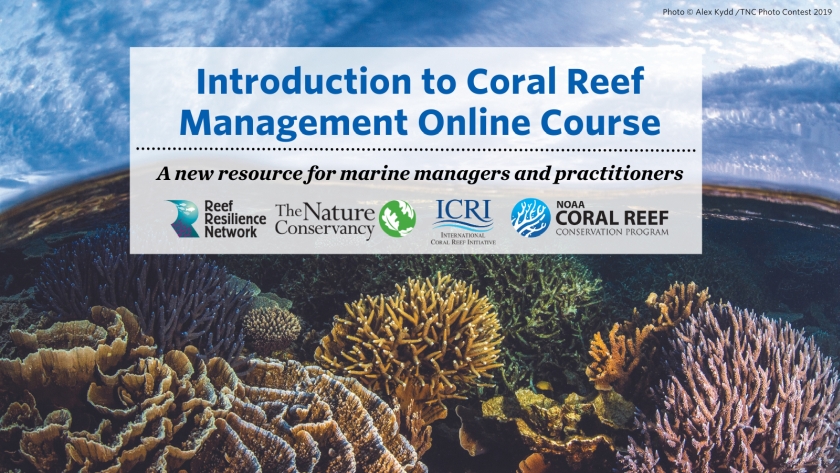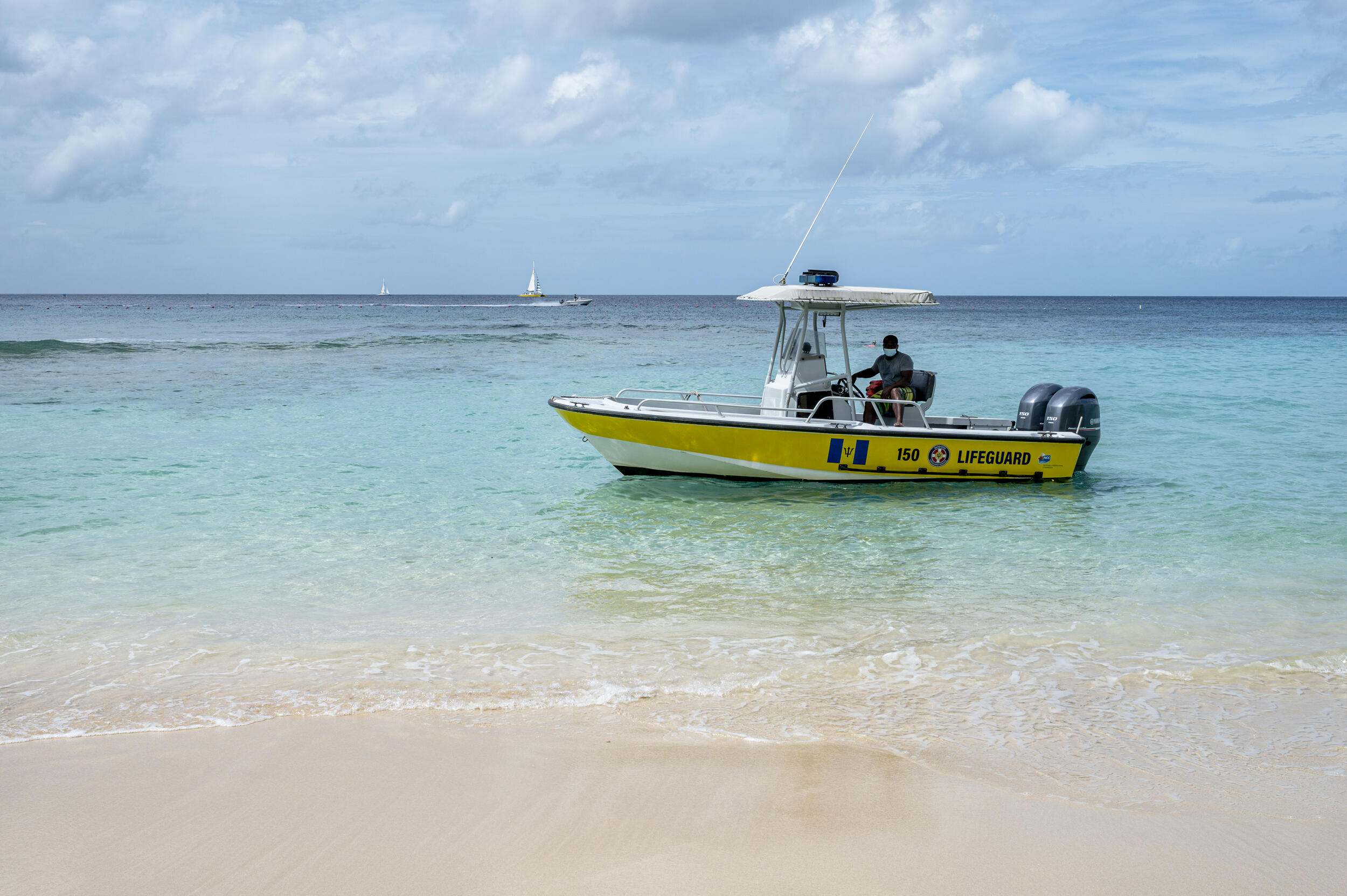Sanitation Best Management Practices in West End, Honduras
Location
Roatan, West End, Honduras
The challenge
Limited sanitation and wastewater treatment infrastructure represent a significant challenge to global and nationwide conservation efforts. Honduras’ overall performance concerning SDG6 (Sustainable Development Goal 6): Clean Water and Sanitation shows that the percentage of anthropogenic wastewater that receives treatment is 3.2 % (2018). When it comes to SDG14: Life Below Water, the Ocean Health Index: Clean Waters score ranked at 59.2 out of 100 (2019) (Sachs et al. 2020).
This situation represents a serious threat since substandard water quality is detrimental to corals. Sediments, nutrients, and pathogens are known to be major drivers of coral reef degradation. It is also a threat to human health and the tourism industry which is essential to the Honduran economy. Over a million tourists visit the island of Roatán in the Bay Islands each year, drawn to its colorful reefs, white-sand beaches, and clear waters. In 2014, tourism directly contributed US$1billion to the Honduran economy (World Travel and Tourism Council 2015). According to 2019 data from the Bay Islands Tourism Bureau, Roatan’s annual tourism income is approximately US$ 490 million, with a yearly expenditure of US$190 million.
Actions taken (timeline 2006-2020)
The Coral Reef Alliance (CORAL) has been leading efforts to improve water quality in Honduras since 2012. In response to a community engagement effort beginning in 2011 when the mayor identified a wastewater treatment plant as a community infrastructure need, the West End wastewater treatment plant (WWTP) was built. This was a major milestone for coral reef conservation in Roatan and was a collaboration between CORAL, the government, donors, and the community. Ongoing support from donors has helped connect new properties to the treatment plant and increase the coverage of wastewater treatment to 97% of homes and businesses in the West End. These connections reduce the amount of raw sewage discharged into the environment by treating 28 million gallons of wastewater per year.
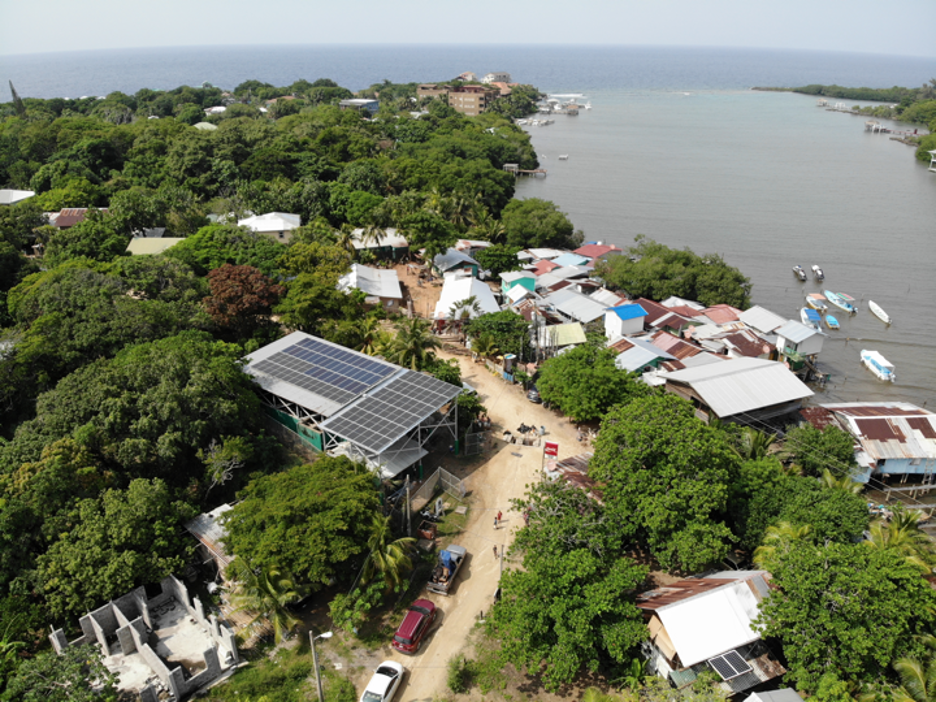
West End Wastewater Treatment Plant. Photo © Joel Amaya
The West End WWTP, operated by Polo’s Water Association Waterboard, provides secondary treatment of sewage. Digestion, anoxic and aeration tanks, clarification, drying, and aeration pumps create activated sludge and then effluent is disinfected with chlorine prior to discharge. The plant treats 394 of its 500 m3/day capacity each day. The technology and equipment used by the plant are regularly assessed by third-parties to ensure effectiveness, and the plant is set to undergo upgrades in the future (in 2022, aerator pumps will be replaced by a bubble diffuser system and an anoxic denitrification tank will be added in 2030).
In addition to treatment, complementary testing and analyzing of the marine water quality by the Bay Islands Conservation Association (BICA)-Roatan has confirmed the improvement of water quality in this area. BICA-Roatan, in collaboration with CORAL and other funders such as the Mesoamerican Reef Fund (MARFUND), now has the first and only water quality laboratory in the Honduran insular region. The water quality program has helped to establish a benchmark for threat assessment to facilitate decision-making to protect the reef by providing solutions based on local data.
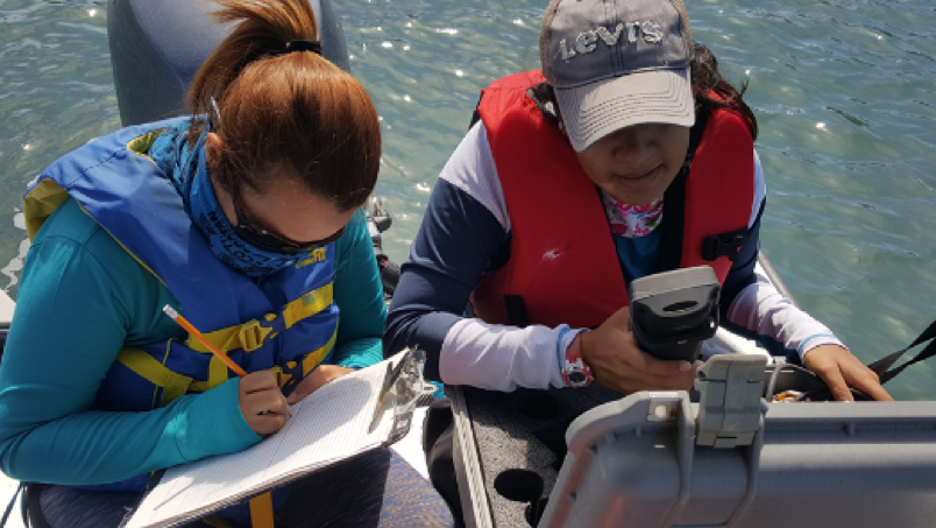
Water quality monitoring by BICA Roatan. Photo © BICA Roatan
The West End WWTP has played a critical role in spearheading Sanitation Best Management Practices (SBMPs) to facilitate continued investment in sanitation. CORAL, the Polo Waterboard, and community stakeholders came up with the following SMBPS: having a treatment facility to serve the community, integrated management involving the community, water quality monitoring of effluent discharged and surrounding marine sites, and ensuring sanitation solutions are environmentally and financially sustainable over the long term. In October 2020 the installation of 62 solar panels reduced daytime energy consumption by 80% and significantly reduced monthly operating costs. Resulting savings were reinvested into an assessment of the WWTP to identify necessary upgrades for continued compliance with national and regional standards (such as the Cartagena International Convention) as well as increasing treatment capacity for the projected population growth of the greater West End area and its tourism industry until the year 2040.
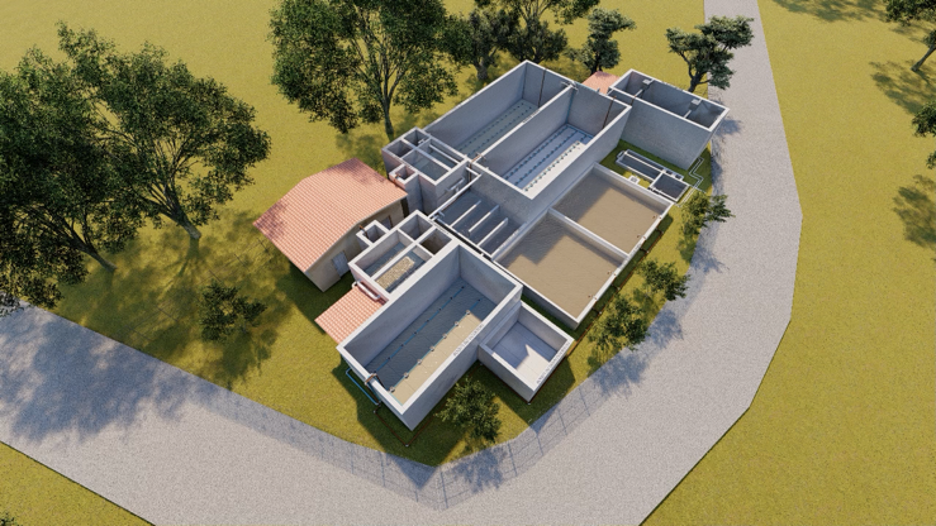
Architectural model for projected improvements of the West End Wastewater Treatment Plant. Photo © Polo’s Waterboard
In addition to strengthening sanitation and wastewater infrastructure, CORAL also supported Polo’s Waterboard path towards financial sustainability, allocating funds to reduce operational debt. This has allowed the WWTP to survive the COVID-19 pandemic, continue operations, and secure the livelihoods of staff.
How successful has it been?
Since 2013, BICA’s Water Quality Program has analyzed physical and bacteriological parameters in the Sandy Bay West End Special Marine Protection Zone on the northwest side of Roatán, Cordelia Bank on the southwest side of the island of Roatán, Santa Elena Special Marine Protection Zone, and other key communities on Roatan. CORAL’s collaboration with BICA Roatan provides data that shows that the significant reduction of untreated sewage discharge has had a measurable and positive impact on water quality. Starting in August 2017, the public beach in the West End (Half Moon Bay) began to consistently meet U.S. EPA safe swimming standards for Enterococcus, a first for any populated beach in Honduras. In 2020, the Healthy Reefs Initiative reported that fleshy macroalgae decreased from 27% to 24%, possibly from reduced nutrient and sewage pollution (McField et al. 2020).
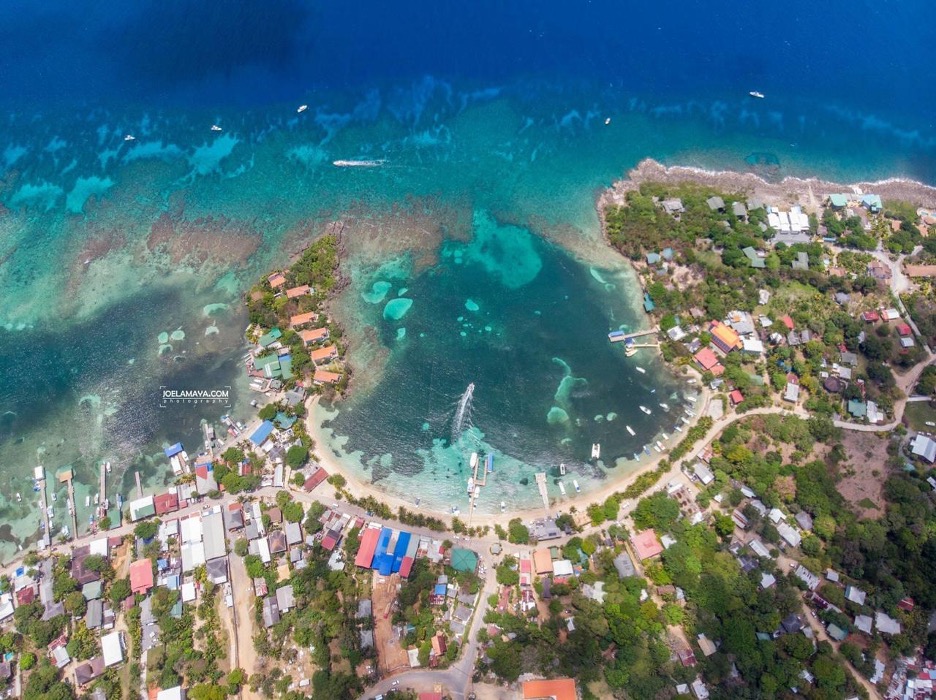
Half Moon Bay, Roatan Certification Ceremony. Photo © CORAL
A clear indicator of the success of the WWTP in improving water quality is that the Half Moon beach obtained an Ecological Blue Flag certification. This is an acknowledgment by the Honduran Ministry of Tourism in collaboration with the Costa Rican Tourism Board (ICT) that validates it as a beach with safe water for tourists, complying with strict standards for recreational waters and subject to annual recertification audits.
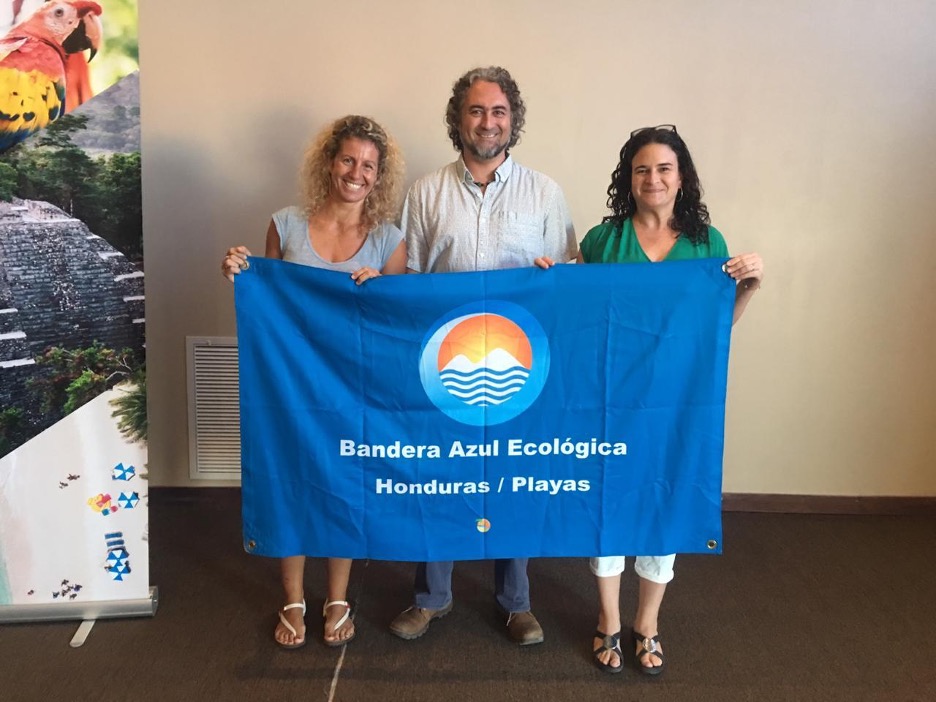
Half Moon Bay, Roatan Certification Ceremony. Photo © CORAL
Data collected by BICA Roatan is fundamental to continued improvement and expansion of sanitation and wastewater treatment infrastructure in Roatan. It has also brought together the private sector, the public sector, and community stakeholders in support of construction of the West Bay WWTP. in the West Bay WWTP is planned for 2021 and is based on the management modeled by the West End WWTP.
Overall, CORAL’s work in the West End has set the stage for addressing water quality issues in Honduras. The success of the West End WWTP has gained the attention of the municipal and federal government, neighboring communities, and cooperation agencies such as the Inter-American Development Bank (IDB) and the Central American Bank for Economic Integration (CABEI). IDB and CABEI are currently working with the Honduran government on a multi-million dollar investment in wastewater infrastructure for Honduras’ coastal municipalities.
Lessons learned and recommendations
- Implementing SBMPs improves coral reef health by reducing disease in corals.
- Water quality monitoring is critical to ensure water and sanitation issues are successfully addressed.
- Establishing SBMPs at a community level is a long-term process that requires trust and collaboration. CORAL successfully included the West End community and young female professionals in the water and sanitation value chain.
- Wastewater treatment plants are one solution and a cornerstone of having SBMPs in place. Identification of highly efficient technologies to reduce operative and maintenance costs is also essential, and includes thinking about brands and companies that are accessible when reparations are needed.
- The West End WWTP’s community-based management has contributed to an increased awareness of the vital connection between access to public services, population well-being, and environmental conservation.
- CORAL gained community buy-in by developing trust between Polo’s Waterboard and its customers. This was a highly participatory processes to establish potable water and wastewater treatment rates that are tied together, accountability, and financial transparency.
- Sustainability of the management model needs to be based on a strict financial planning that considers reinvestment of revenue into the system. Access to ongoing funding allows operators and communities to ensure and increase the effectiveness of wastewater treatment over time.
- Water quality data, analysis, and strategic sharing are pivotal to promote public and private investment in sanitation, enforcement of water quality regulations, and collaboration between stakeholders.
- Third-party assessments to identify the status of infrastructure as well as areas for improvement and future investment are critical.
- The management model of the West End wastewater treatment plant can be adapted and replicated in other communities in the Bay Islands of Honduras and in coastal areas within the Mesoamerican Reef (MAR) and Small Island Developing States (SIDS) based on their shared geographical characteristics and challenges.
- Stakeholder engagement, focused on both the public and private sectors, allowed CORAL to establish strong partnerships which gained the support of cooperation agencies, donors, and policy makers.
Funding Summary
Funding for these projects was provided by grants, subgrants, and financial and in-kind donations by the West End Community.
Lead Organizations
The Coral Reef Alliance (CORAL)
Polo’s Waterboard
Healthy Reefs Initiative (HRI)
Partners
The Mesoamerican Reef Fund (MARFUND)
Bay Islands Conservation Association (BICA – Roatan)
The Summit Foundation (SUMMIT)
The Deutsche Gesellschaft für Internationale Zusammenarbeit (GIZ)
Inter-American Development Bank (IDB)
Central American Bank for Economic Integration (CABEI)
West Bay Hotel Owners Association
Municipality of Roatan
Resources
The Sustainable Development Goals and COVID-19, Sustainable Development Report (Sachs et al. 2020)
Travel and Tourism: Economic Impact, Honduras (World Travel and Tourism Council 2015)
Mesoamerican Reef Report Card 2020 (McField et al. 2020)
Honduras’ Profile Sustainable Development Goals
Half Moon Bay – Blue Flag Certification

